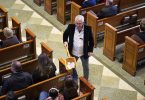
Pope Francis holds a monstrance on the feast of Corpus Christi June 18 at Rome’s Basilica of St. Mary Major. (CNS/Tony Gentile, Reuters)
by Cindy Wooden
ROME (CNS) — The Eucharist is a tangible reminder of God’s love, and receiving Communion is a call to work to build the body of Christ by loving others and shunning all that sows division within a community, Pope Francis said.
The Eucharist should “heal our ambition to lord it over others, to greedily hoard things for ourselves, to foment discord and criticism,” he said June 18, celebrating the feast of the Body and Blood of Christ. “May it awaken in us the joy of living in love, without rivalry, jealousy or mean-spirited gossip.”
Pope Francis celebrated the Mass outside the Basilica of St. John Lateran, the cathedral of the Diocese of Rome. With an almost constant breeze cooling the warm Rome day, thousands of people — including children who made their first Communion this spring — gathered outside the basilica for the evening Mass and for the Corpus Christi procession later from St. John Lateran to the Basilica of St. Mary Major, about a mile away.
The 2017 feast day included two major changes from past practices. First, although Italian dioceses, like many around the world, moved the feast from a Thursday to a Sunday in the late 1970s, the Mass and procession with the pope at St. John Lateran remained on the Thursday until this year.
Second, instead of transporting the Blessed Sacrament on a truck in the Corpus Christi procession this year, it was carried on a platform held aloft on the shoulders of four men. Eight other men carried tall poles holding a canopy over the platform, a task made more difficult by the breeze.
The truck had made its first appearance in 1994 when St. John Paul II began having difficulty walking. He and now-retired Pope Benedict XVI would ride on the truck, kneeling or sitting before the monstrance.
Elected at the age of 76, Pope Francis walked behind the truck for the 1-mile procession in 2013. But beginning in 2014, because of his difficulty walking long distances and in order to avoid drawing attention away from the Eucharist, he met the procession at St. Mary Major instead of participating in it.
In his homily at the Mass, the pope said the Eucharist “is the sacrament of memory, reminding us, in a real and tangible way, of the story of God’s love for us.”
Just as the Israelites were called to remember how God led them safely through the desert, he said, “remembering all that the Lord has done for us is the foundation of our own personal history of salvation.”
“Remembrance is essential for faith, as water is for a plant,” Pope Francis said.
Remembering, he said, keeps people “mindful, never forgetting who it is who loves us and whom we are called to love in return.”
Pope Francis said it seems that today people’s ability to remember and be mindful is weakening.
“Amid so much frantic activity, many people and events seem to pass in a whirl,” he said. “We quickly turn the page, looking for novelty while unable to retain memories.”
But the focus on living for the moment, he said, often means living superficially and without a focus on “who we are and where we are going.”
The feast of the Body and Blood of Christ, the pope said, reaches people even in their “fragmented lives,” reminding them how Christ was broken for their salvation and continues to offer himself in the “loving fragility” of the Eucharist.
“In the Bread of Life, the Lord comes to us, making himself a humble meal that lovingly heals our memory, wounded by life’s frantic pace of life,” he said.
“The Eucharist is flavored with Jesus’ words and deeds, the taste of his passion, the fragrance of his Spirit,” he said. “When we receive it, our hearts are overcome with the certainty of Jesus’ love.”
At the same time, the pope said, the Eucharist is a reminder that Christians are not isolated individuals but are called to receive Christ’s body together and to build up the body of the church.
“In experiencing this Eucharist,” he told those at the Mass, “let us adore and thank the Lord for this greatest of gifts: the living memorial of his love that makes us one body and leads us to unity.”






